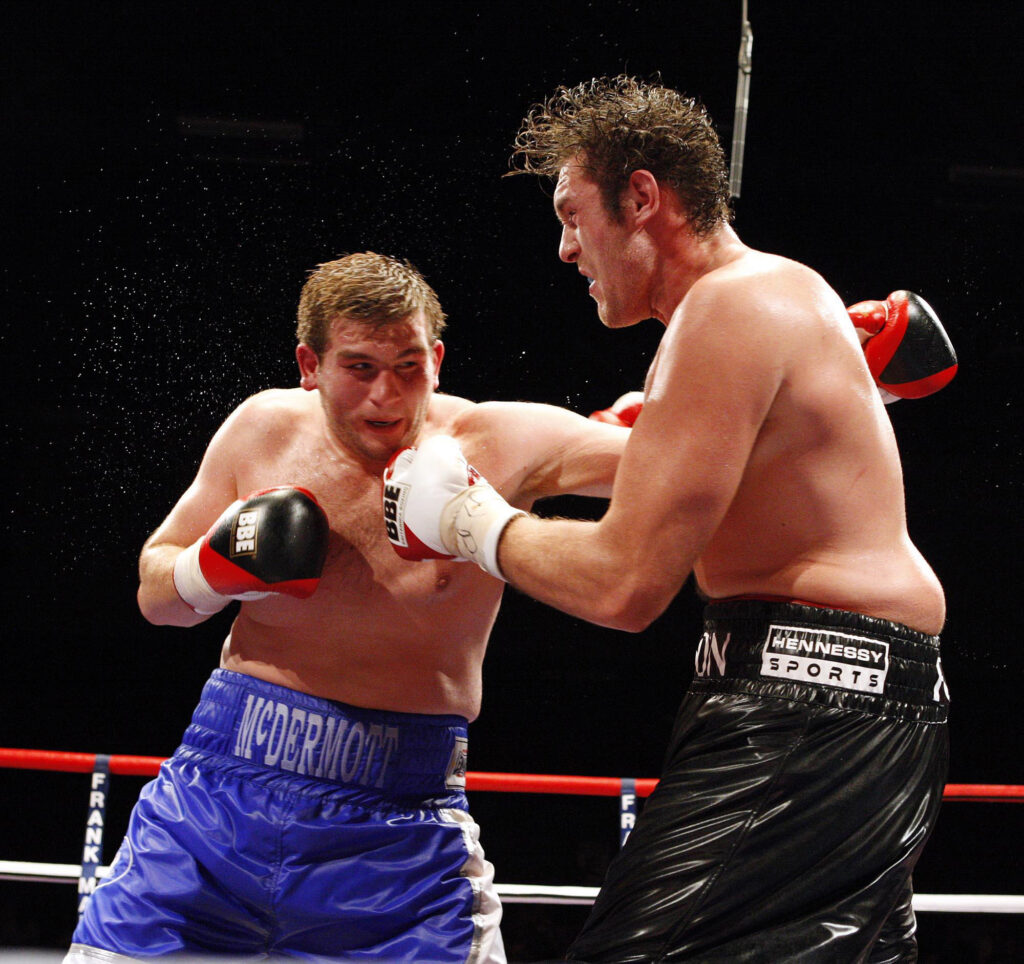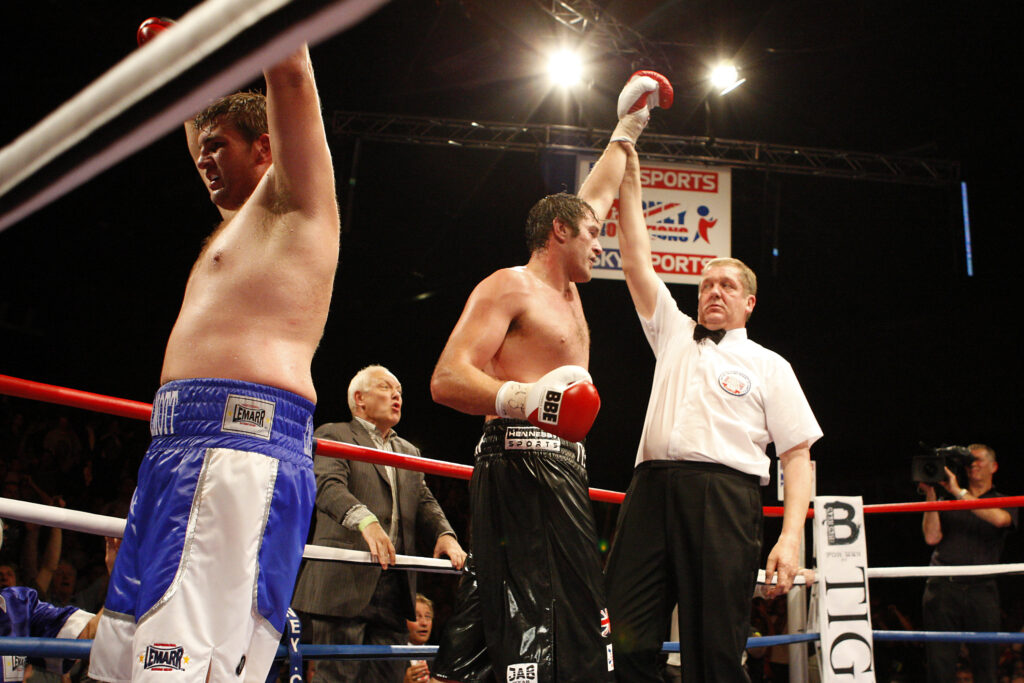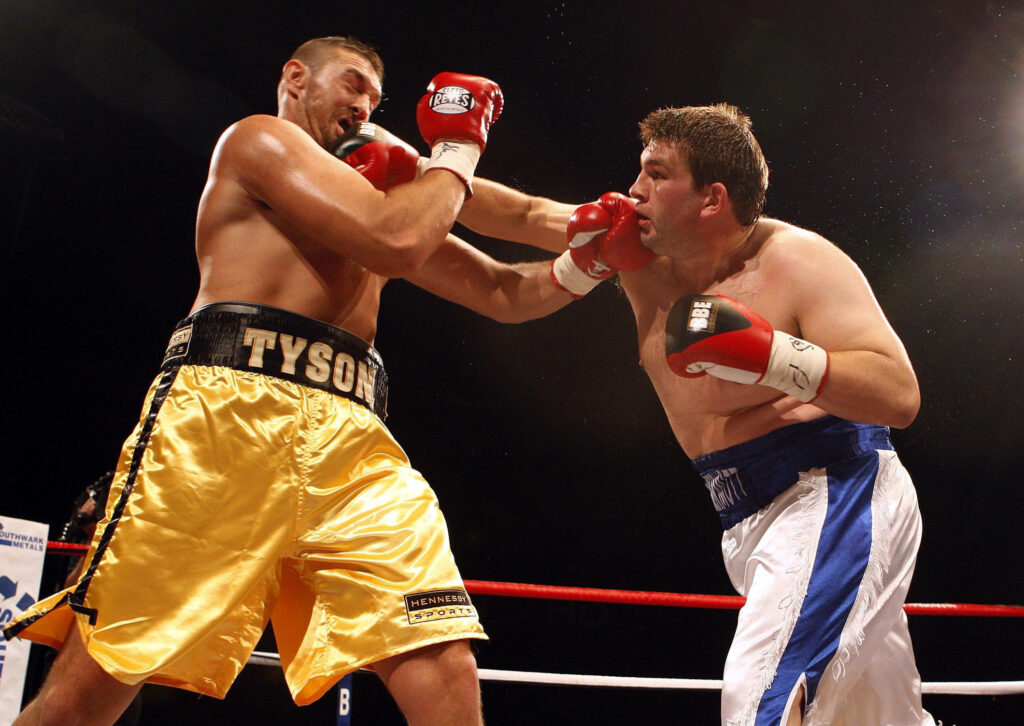Tyson Fury is king of heavyweights right now, but back in 2009 many thought he lost to John McDermott in an English heavyweight title fight. Now retired, ’Big Bad John’ is still convinced he beat the Gypsy King. He tells Luke G. Williams his story…
When John McDermott answers Boxing Social’s phone call there is a hint of good-natured exasperation in his voice.
“I’m using a wallpaper steamer and it’s set the bloody smoke alarm off,” he announces.
Lockdown life, McDermott explains, is an unremitting diet of monotony interspersed with bouts of DIY.
“It’s boring, innit?” he sighs, “but we moved not that long ago and there’s so much to do in the house so I’m just getting on with that.”
It’s an apt introduction to a man whose everyman demeanour and down-to-earth charm won him many friends during a 13-year, 28-8 pro career, albeit nowhere near the range of honours his accomplished talents warranted.
Twice English heavyweight champion as well as a Southern Area titlist, McDermott would have been British champion, and perhaps a whole lot more besides, had the fickle finger of fate not intervened to his detriment on more than one occasion.
And yet, despite having more cause than most former boxers to gripe and grumble, the now 40-year-old’s honest appraisal of the injustices and misfortunes he suffered in a rollercoaster career never lapses into self-pity or bitterness.
Indeed, you’d be hard pressed to find a boxer with a more philosophical outlook.
“Boxing didn’t do me no favours and it didn’t do me no harm, I suppose,” McDermott reflects. “I went around the world – Russia, Germany, Finland, Poland, all over the place. I sparred everybody. I had good experiences but I didn’t quite make it.”
Warming to his theme, McDermott adds: “In boxing you need a bit of luck and some of the decisions I got …”
The sentence is left unfinished, but the sentiments we will return to in due course.
For now a restrained McDermott merely adds: “It’s one of them things – what can I do? And you know what they say – today’s news is tomorrow’s chip paper.”
Did he humble the Gypsy King? Watch and decide.
For good or ill, boxing is in McDermott’s blood. His father Stan fought professionally (13-6-1 according to Boxrec). Father and son were both managed by John Branch, the colourful founding director of Antique Bronze, a renowned architectural and sculptural restoration business, where McDermott also served an apprenticeship and worked for many years, helping restore the sculpture of ‘Boadicea and her Daughters’ to the north of Westminster Bridge and ‘Cleopatra’s Needle’ on the Victoria Embankment among others.
When he wasn’t working for Antique Bronze or developing his own interest in painting and sculpture, McDermott carved out a short but accomplished amateur career. He lost his first unpaid bout, but fighting for St. Pancras ABC won the ABA super-heavyweight crown in 2000, a title future nemesis Tyson Fury would also claim eight years later.
Remarkably, McDermott’s journey from amateur debutant to ABA champion took just nine fights.
“I stopped most of them very early, most of them in the first round,” he says of a run during, which he once claimed to have been hit only 12 times in total.
”I think I went into the second round once. The thing was I was training and sparring with professionals, all sorts of names.”
In the wake of his ABA triumph, McDermott turned over, a decision he now regrets. “I really should have stayed amateur a bit longer. I was selected to box for England and go to Crystal Palace. But I was offered a good deal for my first pro fight.
“I was stuck between a rock and a hard place really. I had no money to carry on in the amateurs but I didn’t want to turn professional. I was just 20 which was a bit too young.”
McDermott also believes that an early run of undistinguished opponents in the pro ranks did him few favours.
“Maybe John [Branch] protected me a bit too much, looking back now,” he says. “Maybe I should have been put out a bit more. But obviously John liked me and wanted to look after me. He was a good manager and a good friend.”
McDermott’s early progress stalled with a surprise reverse against Russian Nikolay Popov in his 17th pro start in September 2003. However, it was a points loss for the English title against Mark Krence just over a year later that really knocked the stuffing out of him.
“That loss made a massive difference to my career,” McDermott argues. “It was a really bad decision – beyond a joke. I remember I had a meeting with Frank Warren who promoted me [at the time] and he said he’d never seen a worse decision.”
A subsequent one-round defeat to Matt Skelton for the British title in December 2005 left McDermott with seemingly nowhere to go.
He didn’t return to the ring for over a year, but when he did a run of six straight victories followed, including a career resurrecting second-round TKO of Pele Reid for the English crown in April 2008.
Next came that fateful run of three controversial losses that – for better or worse – would define McDermott’s career; two defeats against Danny Williams for the British championship and a loss against Tyson Fury for the English title.
At the end of the day, Sliding Doors style speculation about what would have transpired had those three contests edged to McDermott are pointless.
Nevertheless, it’s a luckless run that still inspires disbelief.
“If you watch the first fight with Danny Williams, he got three points taken off, I got a 10-8 round too and I never got knocked down, so how could I lose?” McDermott asserts. “The worst I should have been able to get was a draw. It was crazy.”
Williams retained his title via a majority decision in the first contest and a split decision in the rematch. The referee for the latter contest was a man who, even more than Danny Williams or Tyson Fury, proved to be McDermott’s bête noire.
“Terry O Connor,” McDermott sighs. “You know my dad boxed him twice? As an amateur he knocked him out and then he boxed him in an eliminator for a Southern Area or maybe British title and knocked him out again.
“I don’t know if you’ve seen the fight with Tyson Fury. I mean I’m not blaming Fury – it was nothing to do with him – but how could [O’Connor] give it to him by eight rounds?”
Ah yes, the Fury fight.
Forget the discussion surrounding the judges’ verdict in Fury vs Wilder I, Fury vs McDermott I at the Brentwood Centre in September 2009 is the most controversial fight of the Gypsy King’s career.
For 10 torrid rounds, Fury battled manfully to deal with a tireless McDermott, who had seemingly been inspired by the Gypsy King’s ceaseless pre-fight slurs against his ever fleshy physique that included ‘McMuffin’ and ‘Big Mac’.

Fury has since been floored by Neven Pajkic, Steve Cunningham and twice by Deontay Wilder, but no one before or since out-boxed him for such extended stretches as McDermott did.
Commentating that night for Sky Sports, Jim Watt made McDermott a clear winner, as did most of the ringside media, but the one man whose decision mattered was O’Connor and he raised Fury’s hand, awarding him the fight by an absurd margin of 98-92 – eight rounds to two.
An incredulous Watt summarised many’s feelings when he declared: “I can’t make a case for Tyson Fury winning this… Has he [O’Connor] got the names mixed up? I can’t explain that.”
Promoter Frank (now Kellie) Maloney was also incensed, declaring: “That was a bigger robbery than the Holyfield-Lewis draw… Dick Turpin at least [wore] a mask when he robs you.”
McDermott’s restraint when discussing the fight is admirable, although the controversial verdict clearly still hurts.
“I couldn’t believe it at the time. I was dumbstruck to be honest, but that’s life. What can you do?
“Fury was a very good boxer. I really trained for that fight and worked hard with my trainer C.J. Hussein. I knew Fury would come to me and I met him halfway. The idea was to out jab him and to also use the overhand right. Obviously, he was a good fighter, an awkward guy to hit. And he’s improved ten-fold since then.”
Recalling the moment Fury’s hand was raised by O’Connor, McDermott says: “My three fights before that had all been championship fights with three judges, so automatically I walked back to my corner to wait for the decision. I wasn’t really thinking.
“Then he held Fury’s hand up. I literally couldn’t believe it – I thought: ‘nah can’t be, you’ve made a bloody mistake, mate!’ Honestly, I thought he’d made a mistake!
“It affected me massively. I don’t know if you watched the interview after but I remember saying: ‘what do I have to do to win?’”

Photo: Press Association.
According to McDermott, after the fight Fury’s father John also had something to say about the decision.
“To give Tyson Fury’s dad his due, when I walked outside with the wife to get in the car he pulled up in his jeep and said: ‘I know my boy got the decision but you won that, mate’. All due respect to him for saying that.”
In June 2010, McDermott and Fury went at it again in a punishing rematch. This time there was no argument about the outcome as McDermott was stopped in nine rounds.
“For the second one, I wasn’t training with C.J., we’d had a bit of a falling out, over something stupid. I was trained by Jim McDonnell and over-trained myself to the point I had nothing left. I wanted to win so bad, I just over-trained. I also had glandular fever three weeks before.
“And it was hot that day, about 33 degrees. I got to about the sixth round and just hit a brick wall. The arena was ram-packed, and it just got hotter and hotter.”
McDermott did, however, win Fury’s respect.
“Before the second fight he didn’t trash talk like the first fight. I think he underestimated me before. But now he knew I was there to fight – that I was the sort of bloke who would never give up,” he said.
“In the first fight, I think I gained respect not only from him but from his family as well.”

Photo: Press Association.
Post-Fury, McDermott fought just four more times, being KO’d in one by David Price, but also stopping Larry Olubamiwo for the Southern Area title and finishing his career on a high by beating former conqueror Matt Skelton for the English title on points.
McDermott intended to fight on, but as he explains: “I couldn’t get any fights. Literally for two years I was training every day and no one wanted to fight me. The Board put out tenders for the English title and everything.
“I was tough, a gutsy guy. I think for the young boys coming up I was too much hard work.
“What tipped me over the edge really, was that I was meant to fight Hughie Fury but nothing happened. So I thought that’s it – I’ve had enough.”
McDermott’s final appraisal of his career is typical of his blunt honesty.
“I think I done well, but I could have done better. The guys today are getting a lot more money than we did. I’ve heard that Dave Allen has got numerous properties.
“Well, I can assure you I never got enough money to do that! And I think I’d have beaten Dave Allen. I’d have beaten him easy.
“When I boxed Fury I got about £20,000 and my biggest purse was about £21,000. I think they get a lot more than that now – and good luck to them they deserve it, I just wish I’d got it!”
Nearly four years after his final bow against Skelton, McDermott’s manager and boss John Branch died.
For ‘Big Bad John’ it was time to leave Antique Bronze and start a new chapter in his life.
“I thought I’d break ties and try something else,” he reflects. “I’ve been working on Crossrail. Being on the railways is really hard work. I do every hour possible. When I first started I did 13 days on and one day off for about two years.
“Crossrail has almost finished now. What with lockdown I don’t know if I’m going back. I’ll have to start looking for another job and do something else I suppose.”
Truth be told, the ‘Big Bad John’ moniker never really suited McDermott, whose genial nature was perhaps not best suited to the cutthroat world of prize fighting.
Even now, looking back on a career that could have delivered so much more were it not for the whims of officialdom, he can’t summon much spite or invective.
“I’ve got nothing against Tyson Fury,” he shrugs. “He did everything he could to better himself. Good luck to him, the man has proved what he can do.
“He beat the man [Wladimir Klitschko] that no one could beat – I know he was coming towards the end of his line, but he was beating everyone easy.
“Fury is a good boxer and it’s fantastic what he’s achieved inside and outside the ring. He suffers from depression and to come back from what he has I think is brilliant.
“Anthony Joshua came back amazingly in his last fight [against Andy Ruiz Jr] but I think Fury would beat him easily. He’d out-box him and pull him about. I think it would be a late stoppage or points.
“It will be an obscene amount money so Fury should win that and retire while he’s still got his wits about him. That’s what I would do.”
Of course, if that did happen, it would surely enhance McDermott’s legacy. After all, the more that Fury’s star shines, the more he achieves, the longer he stays undefeated, the better McDermott looks whenever anyone casts their mind back to that electric night of drama in Brentwood.
“That’s true I suppose,” McDermott agrees. “I gave him a run for his money. That’s pretty good really but pretty good don’t pay the bills, does it?…”
